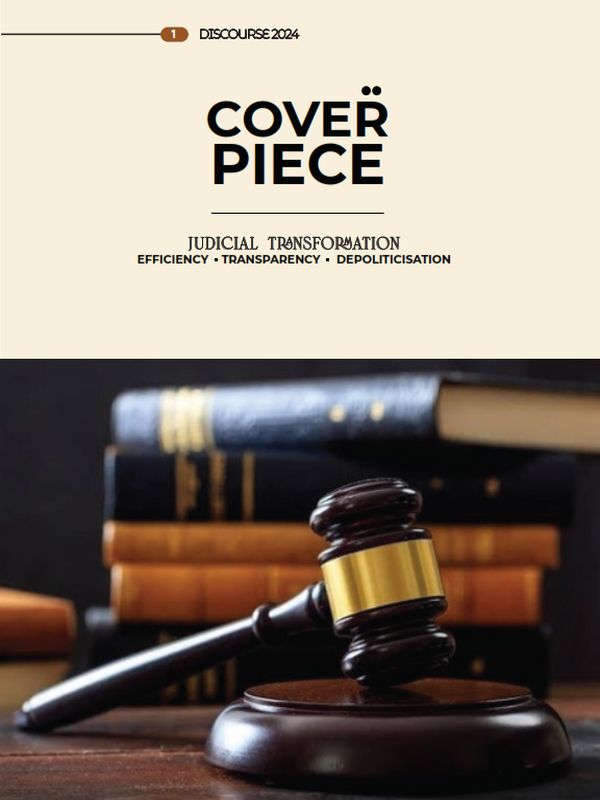
Pakistan Institute of Development Economics
- Home
Our Portals
MenuMenuMenuMenuMenuMenuMenu - ResearchMenuMenuMenuMenuMenuMenuMenu
- Discourse
- The PDR
- Our Researchers
- Academics
- Degree Verification
- Thesis Portal
- Our Portals
COVER PIECE
The judicial landscape of Pakistan has always been fraught with excessive politicisation, where the scales of justice often sway under the weight of political influence. The most recent, and quite blatant, example of this was the 2024 General Elections, in which a coordinated clampdown on a particular party was observed – its electoral symbol stripped, workers detained, and campaigns barred. This is not to mention the incarceration of its leader, largely considered the most popular in the country at the moment, and the coming into power of a coalition that – as per official Form 45s – does not in fact possess a legitimate mandate. From judicial appointments to high-profile cases, the historic politicisation of this key organ of government – particularly by the security apparatus – has eroded public confidence and marred the integrity of legal proceedings. In the absence of a genuinely independent, impartial, and accountable, accessible, and transparent justice system, democracy will continue to remain a pipedream in Pakistan. For this to change, what is required is a critical examination of the executive and legislature in the appointment and removal of judges, as well as the influence of larger political considerations in judicial decision-making.
Another critical area of reform is the streamlining of court procedures and the pace of justice delivery. Pakistan’s courts are notorious for their slow pace, with cases often dragging on for years. This is largely due to the preservation of outmoded systems rife with documentation and paperwork based on colonial-era administrative modalities and the political economy of justice in Pakistan – which leans toward facilitating those with financial capital (particularly land and real estate) over ordinary citizens. This naturally leads to a culture of adjournments, abuse of stay orders, cases being dragged due to simple incompetence on the part of both lawyers and judges, legal advocacy groups and their opportunistic activism, etc. The imperative to streamline court procedures and expedite justice delivery must be pursued with renewed urgency, spurring initiatives such as the Model Criminal Trial Courts and digitalising processes, as well as reviewing and overhauling unnecessary bureaucratic hurdles and institutional inertia.
One of the strategies that has propped up in recent years as a means of addressing the cacophony of litigation is alternative dispute resolution – which could be a possible pathway toward swift, accessible, and cost-effective justice. Defined as “a process in which parties resort to resolving a dispute other than by adjudication by Courts and includes but is not limited to, arbitration. mediation, conciliation and neutral evaluation” in the Alternative Dispute Resolutions Act, 2017, this could be a means of streamlining cases (there are currently an estimated 2.1 million pending) and empowering litigants to reclaim agency over their disputes – alleviating the pressure on already overburdened courts. This is a relatively new domain and must naturally be experimented with, but initial findings suggest that there is a willingness on the part of the public to engage, and ADR services have successfully addressed a gap in the market – particularly for marginalised communities – by educating legal professionals as well as the citizenry and establishing/formalising various kinds of institutions (such as jirgas and panchayats) for its execution.[1]
Rethinking the education and training of legal practitioners is also essential. Pakistan’s legal education system has been criticised for its outdated curriculum, inadequate clinical training, and lack of emphasis on ethics and professionalism. Certain initiatives, such as the Bar Council’s Directorate of Legal Education, have been taken to redress this by working in tandem with schools and colleges across the country to facilitate teacher trainings, promote legal research, organise short courses, and involve students in moot court competitions to prepare them for the challenges of law practice. A series of regulatory measures must also be explored in an effort to ensure that the quality of education is up to a particular standard that allows lawyers to excel in their careers following graduation; thus addressing the chronic underemployment that dominates the landscape currently.
Finally, legal advocacy forms a cornerstone of healthy judicial processes: with a fraternity of lawyers that functions to keep the institution of the judiciary accountable and responsive to the needs and desires of citizens. In Pakistan, lawyers have a storied and multifarious history of protest and pressure politics – the most well-known being the Lawyers Movement of 07-09, which played a pivotal role in toppling the military regime and restoring democracy. On the other hand, however, lawyers in Pakistan have not infrequently abused platforms such as the Bar Council and Supreme Court Bar Association for myopic, opportunistic objectives that have to do with personal interests rather than societal wellbeing. On the other hand, the assigned objective of these platforms – to regulate the conduct and behaviour of legal practitioners – is frequently sidelined, with gross misconduct (particularly in lower courts) routinely going unpunished. During the period 2009-15, less than 5% of complaints that were filed to the various Bar Councils in Pakistan were responded to with penalties for the perpetrators.[2]
Pakistan’s judicial system has long been plagued by excessive politicisation, incompetence, and outmoded practices – leading to a crisis of credibility and public trust. As the country grapples with the challenges of democratic consolidation and the rule of law, the need for judicial reform has become increasingly urgent. In this issue, we explore the key areas that require attention and innovation to ensure a more efficient, effective, and independent judiciary.
We hope you enjoy this issue of Discourse!
Yours sincerely,
Editorial Board
Discourse Magazine
Pakistan Institute of Development Economics
[1] Legal Aid Society: Brief – Alternative Dispute Resolution. https://las.org.pk/thematic-streams/access-to-justice/alternate-dispute-resolution/
[2] DAWN: A failed model. https://www.dawn.com/news/1591874



